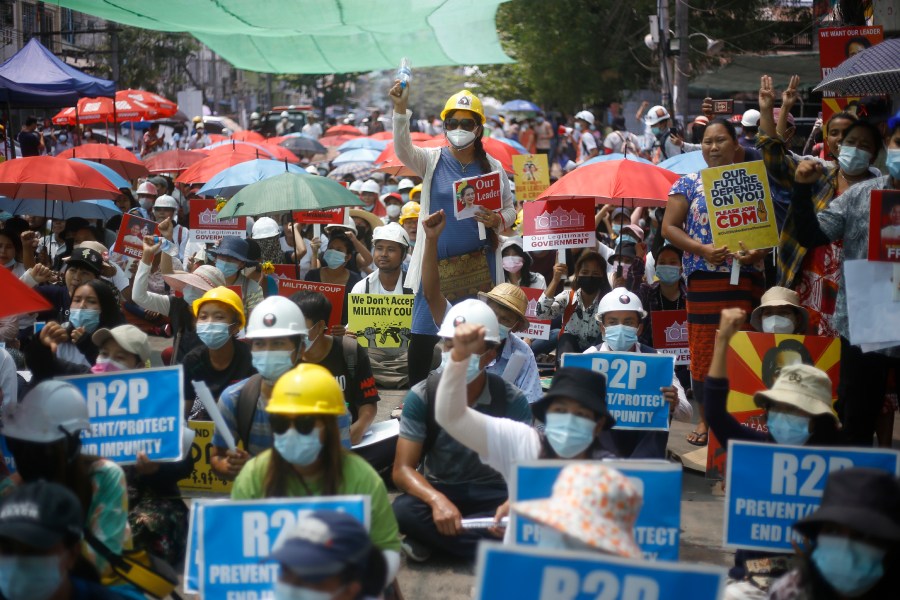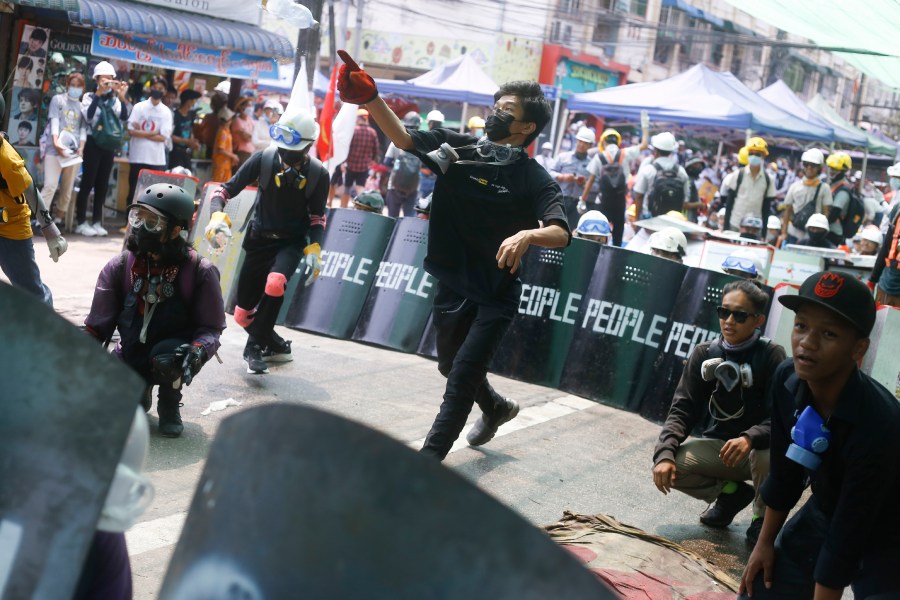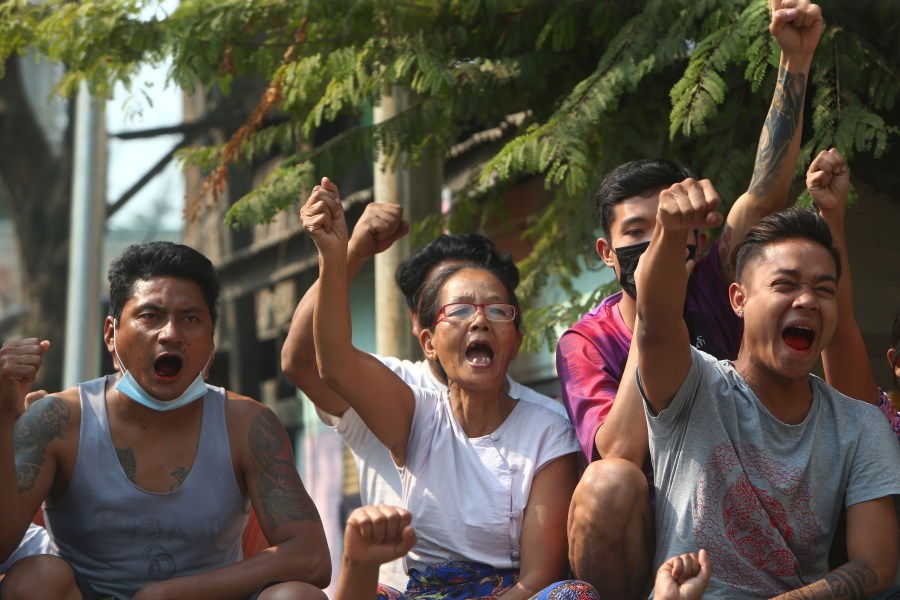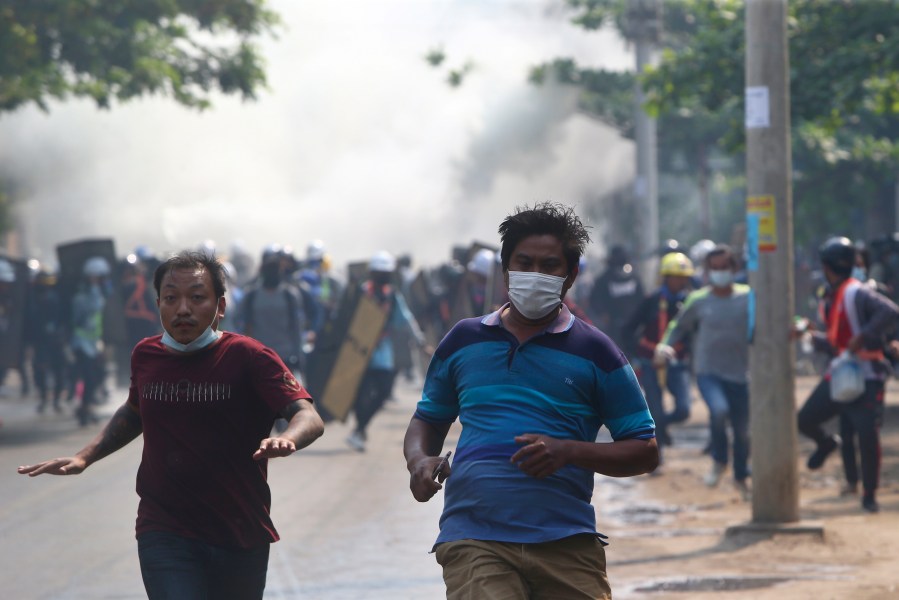At least 12 killed in protests in Myanmar, civilian VP vows resistance to junta

Protesters made up of teachers, medical students and other university students hold an anti-coup demonstration in Mandalay, Myanmar, Saturday, March 13, 2021. Myanmar’s military seized power Feb. 1, hours before the seating of a new parliament following election results that were seen as a rebuff to the country’s generals. (AP Photo)
(Reuters) — Myanmar security forces killed at least 12 people, witnesses and media reported, as the acting leader of a civilian parallel government vowed in a first public address on Saturday to pursue a “revolution” to overturn the Feb. 1 military coup.
Five people were shot dead and several injured when police opened fire on a sit-in protest in Mandalay, Myanmar’s second-biggest city, witnesses told Reuters.
Another person was killed in the central town of Pyay and two died in police firing in the commercial capital Yangon, where three were also killed overnight, domestic media reported.
“They are acting like they are in a war zone, with unarmed people,” said Mandalay-based activist Myat Thu. He said the dead included a 13-year-old child.
Si Thu Tun, another protester, said he saw two people shot, including a Buddhist monk. “One of them was hit in the pubic bone, another was shot to death terribly,” he said.
In Pyay, a witness said security forces initially stopped an ambulance from reaching those who were injured, leading to one death.
A truck driver in Chauk, a town in the central Magwe Region, also died after being shot in the chest by police, a family friend said.
A spokesman for the junta did not answer phone calls from Reuters seeking comment. Junta-run media MRTV’s evening news broadcast labelled the protesters as “criminals” but did not elaborate.
More than 70 people have been killed in Myanmar in widespread protests against the military’s seizure of power, the Assistance Association for Political Prisoners advocacy group has said.
Latest News
- AUTO TEST: Blocks – Checking Link Group Sharing block
- AUTO TEST POST 20241120183649
- AUTO TEST POST 20241120183532
- AUTO TEST POST 20241120183218
- AUTO TEST POST 20241120155846
The deaths came as the leaders of the United States, India, Australia and Japan vowed to work together to restore democracy in the Southeast Asian nation.
Saturday’s protests erupted after posters spread on social media urging people to mark the death anniversary of Phone Maw, who was shot and killed by security forces in 1988 inside what was then known as the Rangoon Institute of Technology campus.
His shooting and that of another student who died a few weeks later sparked widespread protests against the military government known as the 8-8-88 campaign, because they peaked in August that year. An estimated 3,000 people were killed when the army crushed the uprising, at the time the biggest challenge to military rule dating back to 1962.
Aung San Suu Kyi emerged as a democracy icon during the movement and was kept under house arrest for nearly two decades.
She was released in 2008 as the military began democratic reforms. Her National League for Democracy won elections in 2015 and again in November last year.
On Feb. 1 this year, the generals overthrew her government and detained Suu Kyi and many of her cabinet colleagues, claiming fraud in the November elections.
The coup in Myanmar, where the military has close ties to China, is a major early test for U.S. President Joe Biden.
His administration described a virtual meeting with the Indian, Japanese and Australian leaders on Friday, the first official summit of the group known as the Quad, as part of a push to demonstrate a renewed U.S. commitment to regional security.
“As longstanding supporters of Myanmar and its people, we emphasise the urgent need to restore democracy and the priority of strengthening democratic resilience,” the four leaders said in a statement released by the White House.
A spokesman for the junta did not answer phone calls from Reuters seeking comment.
Latest News
- AUTO TEST: Blocks – Checking Link Group Sharing block
- AUTO TEST POST 20241120183649
- AUTO TEST POST 20241120183532
- AUTO TEST POST 20241120183218
- AUTO TEST POST 20241120155846
United Nations human rights investigator Thomas Andrews on Friday dismissed as “absurd” comments by a senior Myanmar official that authorities were exercising “utmost restraint”.
Addressing the U.N. Human Rights Council in Geneva, he called for a united approach to “strip away the junta’s sense of impunity”.
Former colonial power Britain on Friday warned its citizens in Myanmar to leave, saying “political tension and unrest are widespread since the military takeover and levels of violence are rising”.
South Korea said on Friday it would suspend defence exchanges and reconsider development aid to Myanmar because of the violence.
The Kremlin said Russia, which has close ties to Myanmar’s military, was concerned over the mounting violence and was “analysing” whether to suspend military-technical cooperation.
“We evaluate the situation as alarming, and we are concerned about the information about the growing number of civilian casualties coming from there,” Kremlin spokesman Dmitry Peskov was quoted by the TASS news agency as saying.
The U.N. Security Council this week dropped language from a statement that condemned the army takeover as a coup, due to opposition by China, Russia, India and Vietnam.
Poland’s foreign ministry said a Polish journalist was arrested this week in Myanmar, the second foreign reporter to be detained. A Japanese journalist was briefly held while covering a protest.
Riot police and armed soldiers entered the general hospital in Hakha, in the western Chin state, forcing all 30 patients to leave and evicting staff from on-site housing, said local activist Salai Lian.
Soldiers have been occupying hospitals and universities across Myanmar as they try to quash a civil disobedience movement that started with government employees such as doctors and teachers but has expanded into a general strike that has paralysed many sectors of the economy.
On Friday evening, large crowds gathered for evening vigils. In Yangon, they lit candles in the shape of a three-finger salute, the symbol of the movement, while saffron-robed monks gathered outside a pagoda in the northern Sagaing region.














